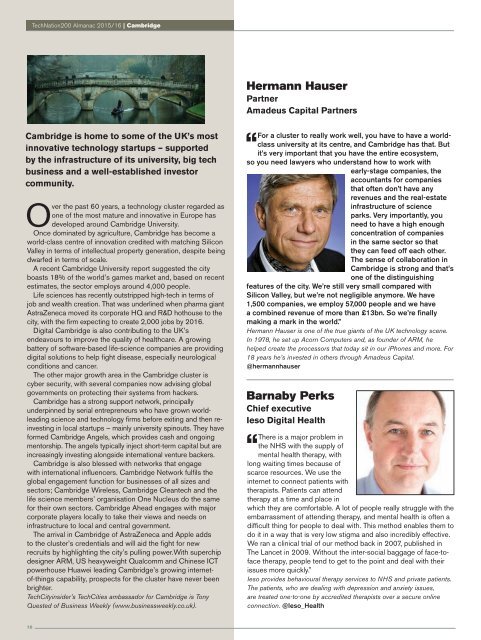TechNation200 Almanac 2015/16
234crey
234crey
You also want an ePaper? Increase the reach of your titles
YUMPU automatically turns print PDFs into web optimized ePapers that Google loves.
<strong>TechNation200</strong> <strong>Almanac</strong> <strong>2015</strong>/<strong>16</strong> | Cambridge<br />
Hermann Hauser<br />
Partner<br />
Amadeus Capital Partners<br />
Cambridge is home to some of the UK’s most<br />
innovative technology startups – supported<br />
by the infrastructure of its university, big tech<br />
business and a well-established investor<br />
community.<br />
Over the past 60 years, a technology cluster regarded as<br />
one of the most mature and innovative in Europe has<br />
developed around Cambridge University.<br />
Once dominated by agriculture, Cambridge has become a<br />
world-class centre of innovation credited with matching Silicon<br />
Valley in terms of intellectual property generation, despite being<br />
dwarfed in terms of scale.<br />
A recent Cambridge University report suggested the city<br />
boasts 18% of the world’s games market and, based on recent<br />
estimates, the sector employs around 4,000 people.<br />
Life sciences has recently outstripped high-tech in terms of<br />
job and wealth creation. That was underlined when pharma giant<br />
AstraZeneca moved its corporate HQ and R&D hothouse to the<br />
city, with the fi rm expecting to create 2,000 jobs by 20<strong>16</strong>.<br />
Digital Cambridge is also contributing to the UK’s<br />
endeavours to improve the quality of healthcare. A growing<br />
battery of software-based life-science companies are providing<br />
digital solutions to help fi ght disease, especially neurological<br />
conditions and cancer.<br />
The other major growth area in the Cambridge cluster is<br />
cyber security, with several companies now advising global<br />
governments on protecting their systems from hackers.<br />
Cambridge has a strong support network, principally<br />
underpinned by serial entrepreneurs who have grown worldleading<br />
science and technology fi rms before exiting and then reinvesting<br />
in local startups – mainly university spinouts. They have<br />
formed Cambridge Angels, which provides cash and ongoing<br />
mentorship. The angels typically inject short-term capital but are<br />
increasingly investing alongside international venture backers.<br />
Cambridge is also blessed with networks that engage<br />
with international infl uencers. Cambridge Network fulfi ls the<br />
global engagement function for businesses of all sizes and<br />
sectors; Cambridge Wireless, Cambridge Cleantech and the<br />
life science members’ organisation One Nucleus do the same<br />
for their own sectors. Cambridge Ahead engages with major<br />
corporate players locally to take their views and needs on<br />
infrastructure to local and central government.<br />
The arrival in Cambridge of AstraZeneca and Apple adds<br />
to the cluster’s credentials and will aid the fi ght for new<br />
recruits by highlighting the city’s pulling power.With superchip<br />
designer ARM, US heavyweight Qualcomm and Chinese ICT<br />
powerhouse Huawei leading Cambridge’s growing internetof-things<br />
capability, prospects for the cluster have never been<br />
brighter.<br />
TechCityinsider’s TechCities ambassador for Cambridge is Tony<br />
Quested of Business Weekly (www.businessweekly.co.uk).<br />
“For a cluster to really work well, you have to have a worldclass<br />
university at its centre, and Cambridge has that. But<br />
it’s very important that you have the entire ecosystem,<br />
so you need lawyers who understand how to work with<br />
early-stage companies, the<br />
accountants for companies<br />
that often don’t have any<br />
revenues and the real-estate<br />
infrastructure of science<br />
parks. Very importantly, you<br />
need to have a high enough<br />
concentration of companies<br />
in the same sector so that<br />
they can feed off each other.<br />
The sense of collaboration in<br />
Cambridge is strong and that’s<br />
one of the distinguishing<br />
features of the city. We’re still very small compared with<br />
Silicon Valley, but we’re not negligible anymore. We have<br />
1,500 companies, we employ 57,000 people and we have<br />
a combined revenue of more than £13bn. So we’re finally<br />
making a mark in the world.”<br />
Hermann Hauser is one of the true giants of the UK technology scene.<br />
In 1978, he set up Acorn Computers and, as founder of ARM, he<br />
helped create the processors that today sit in our iPhones and more. For<br />
18 years he’s invested in others through Amadeus Capital.<br />
@hermannhauser<br />
Barnaby Perks<br />
Chief executive<br />
Ieso Digital Health<br />
“There is a major problem in<br />
the NHS with the supply of<br />
mental health therapy, with<br />
long waiting times because of<br />
scarce resources. We use the<br />
internet to connect patients with<br />
therapists. Patients can attend<br />
therapy at a time and place in<br />
which they are comfortable. A lot of people really struggle with the<br />
embarrassment of attending therapy, and mental health is often a<br />
diffi cult thing for people to deal with. This method enables them to<br />
do it in a way that is very low stigma and also incredibly effective.<br />
We ran a clinical trial of our method back in 2007, published in<br />
The Lancet in 2009. Without the inter-social baggage of face-toface<br />
therapy, people tend to get to the point and deal with their<br />
issues more quickly.”<br />
Ieso provides behavioural therapy services to NHS and private patients.<br />
The patients, who are dealing with depression and anxiety issues,<br />
are treated one-to-one by accredited therapists over a secure online<br />
connection. @Ieso_Health<br />
18


